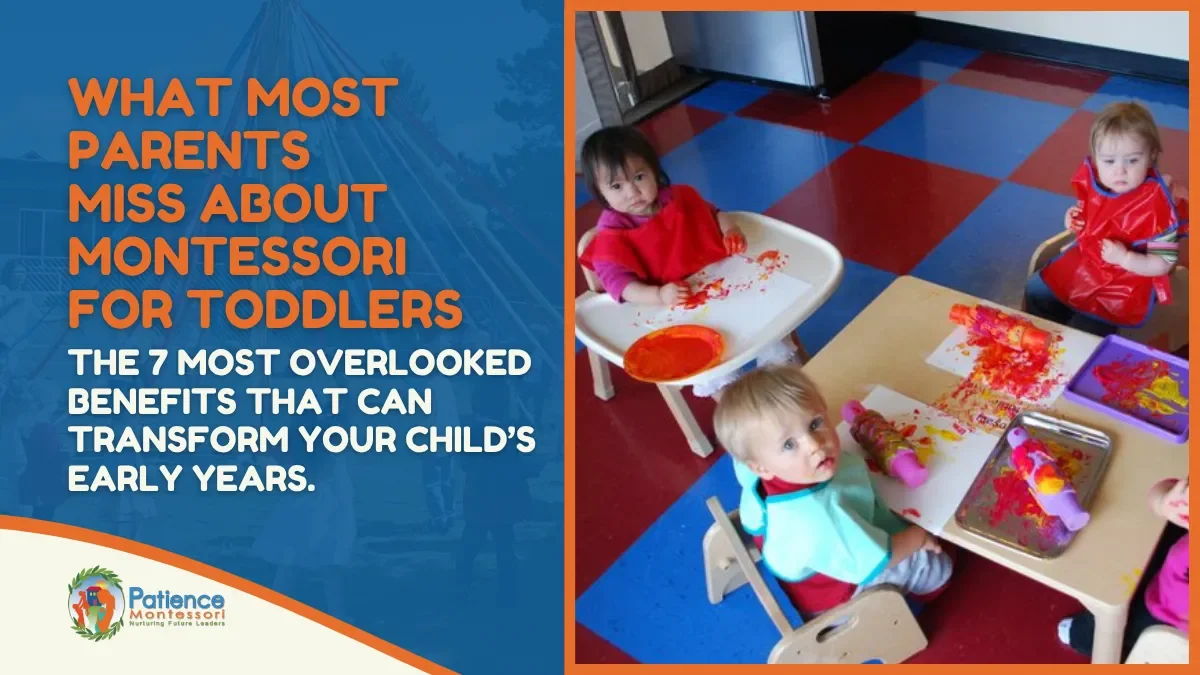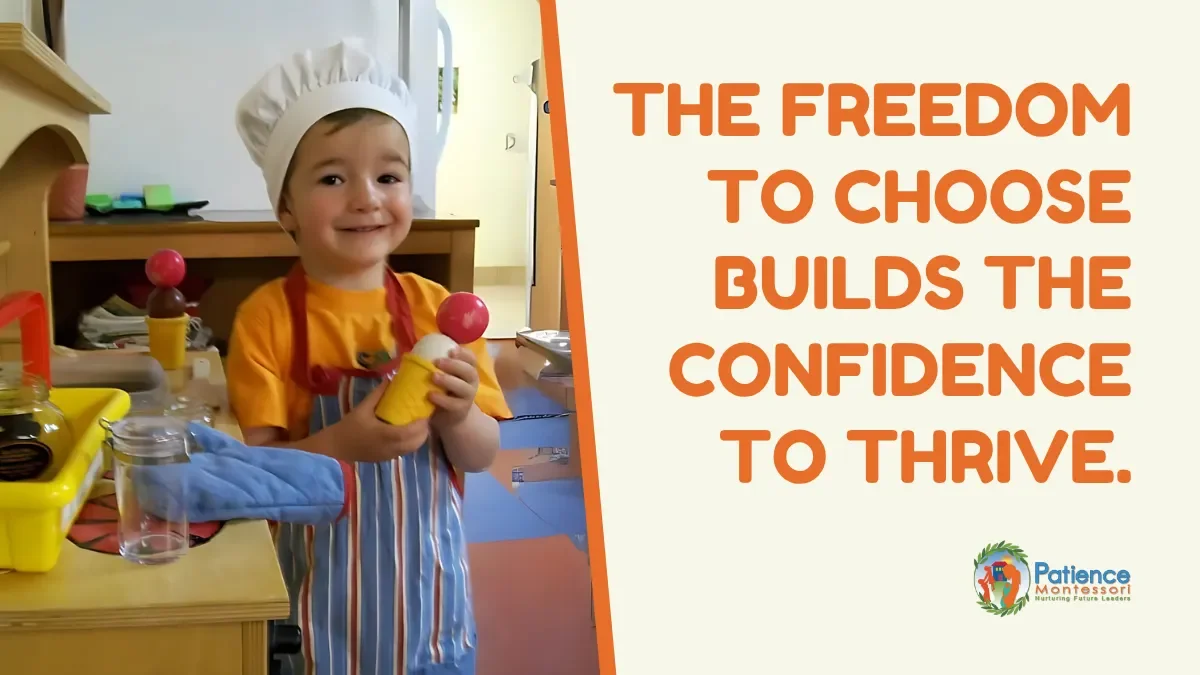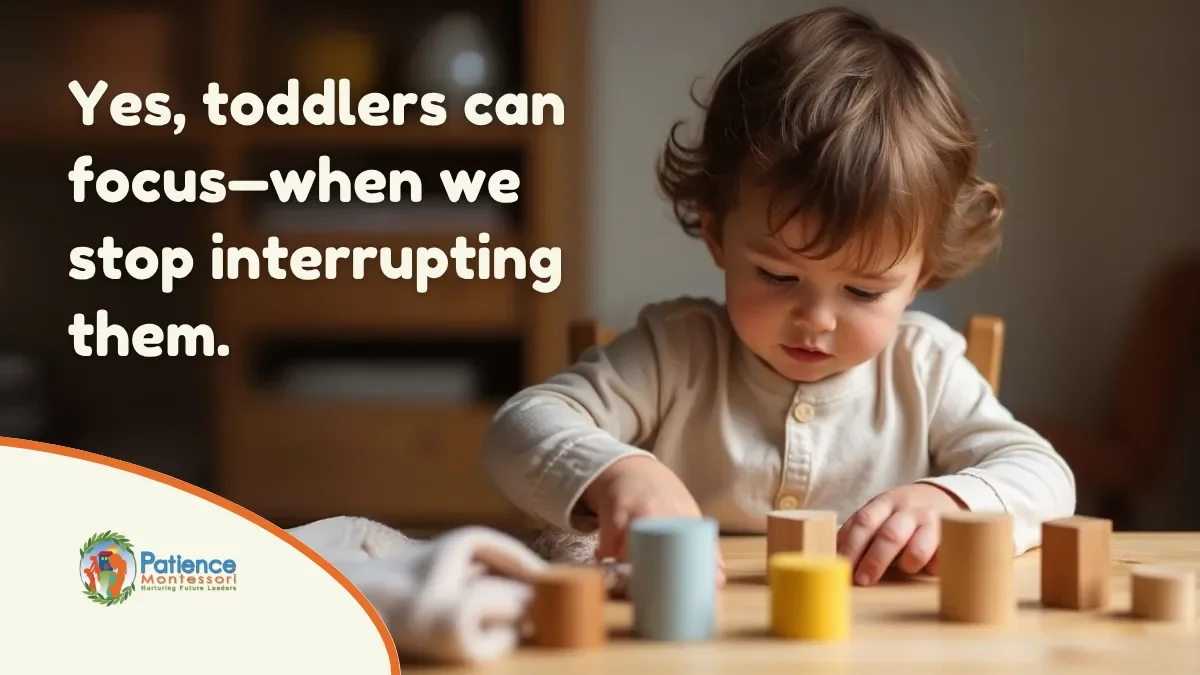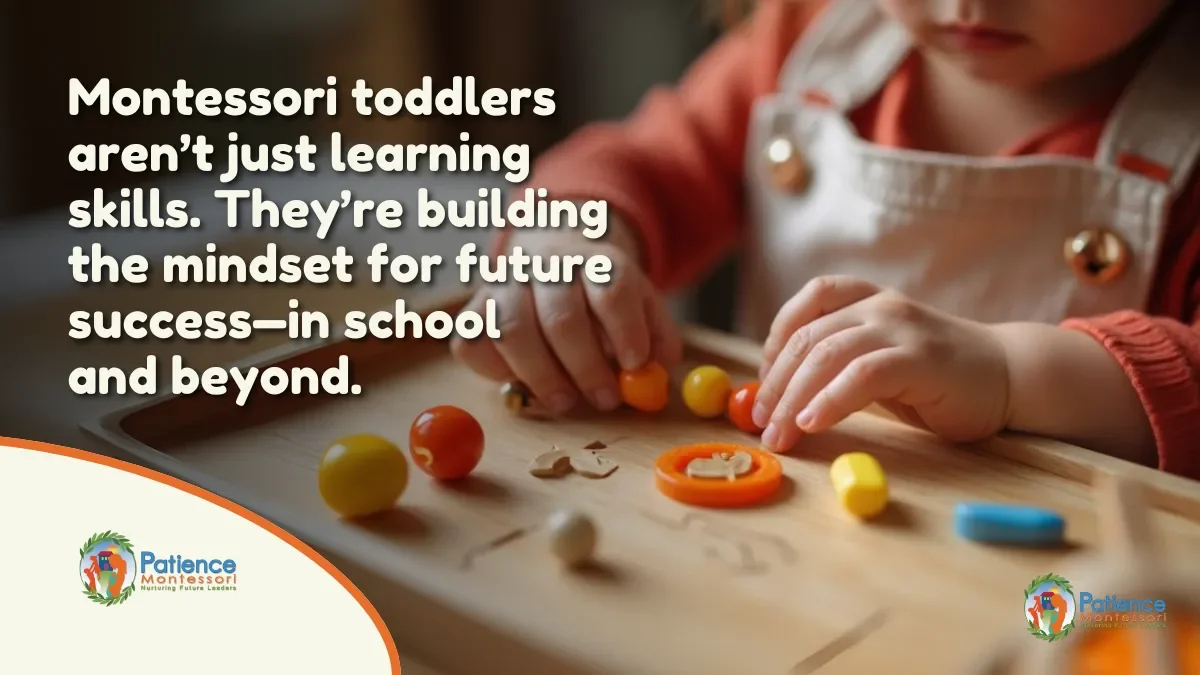
7 Underrated Benefits of Montessori Preschool for Toddlers
The toddler years aren’t just about surviving snack time and naps—they’re the years when your child’s brain is making more connections than at any other stage in life. Every experience, every interaction, and every moment of exploration is building the foundation for how they’ll learn, connect, and grow for years to come. That’s why the benefits of a Montessori preschool for toddlers go far beyond what many parents realize.
Yes, Montessori is about peaceful classrooms and hands-on learning—but its true power lies in how it respects your toddler as a capable, curious, and independent little human. While most early education programs focus on what children should be doing, Montessori focuses on who they’re becoming.
If you’ve ever wondered what those quiet classrooms and tiny trays are really about, this blog will walk you through the deeper—and often overlooked—reasons why Montessori just works.
Why Montessori Works for 2–3 Year Olds
If you’ve ever watched a toddler insist on doing something “all by myself,” you’ve seen one of the strongest developmental drives at this age—independence. Between 18 and 36 months, children begin laying the foundation for who they are and how they relate to the world. This is exactly where the Montessori approach shines.
Unlike traditional methods that often expect toddlers to sit still, follow instructions, or “keep busy,” Montessori environments are carefully prepared to meet toddlers where they are. The classroom isn’t just a space—it’s an environment filled with purpose, order, and calm. Every object is placed intentionally. Every activity has meaning. And every child is trusted to explore at their own pace.
The Montessori toddler program focuses on what matters most during these years:
Movement: Children move freely, building balance, coordination, and body awareness.
Language: Rich conversations, storytelling, and real vocabulary fuel rapid language growth.
Practical life skills: Toddlers pour water, sweep floors, and wash their hands—gaining confidence through meaningful work.
Emotional growth: Respectful interactions help toddlers regulate emotions, resolve conflict, and feel understood.
So why does Montessori work for 2–3 year olds? Because it’s built around what toddlers are already striving to do: understand the world, participate in it, and feel capable while doing so.
The 7 Underrated Montessori Preschool Benefits for Toddlers
There’s plenty of buzz around Montessori—and for good reason. But beyond the beautiful classrooms and tiny trays, there are hidden gems that make a big difference in your toddler’s day-to-day experience. These are the quiet wins that ripple outward, shaping how your child thinks, feels, and grows.
Here are seven underrated Montessori preschool benefits for toddlers that parents often don’t hear about—until they see the results for themselves.
1. Confidence Through Independence
In a Montessori toddler classroom, independence isn’t a milestone—it’s a way of life. From the moment they arrive, toddlers are encouraged to do things on their own: carry trays, pour drinks, and clean up after a snack. These activities may seem small, but they carry enormous weight in building self-worth.
When children are trusted with real responsibilities, they learn to trust themselves. Instead of being rushed through tasks or constantly corrected, they’re given space to explore and succeed.
That moment when your child proudly zips their coat or wipes up a spill without help? That’s confidence in action—and it starts in environments where they’re respected as capable, not controlled. Over time, this creates a resilient, can-do mindset that carries into every area of their development.
2. Fewer Power Struggles, More Peace
Toddlers crave control but often lack the tools to express it. This mismatch leads to many of the classic struggles: tantrums, refusals, and meltdowns. Montessori classrooms are thoughtfully designed with this in mind, offering toddlers safe, structured opportunities to make their own choices.
Whether it’s choosing an activity, deciding when to have a snack, or helping set up a mat, children feel empowered. And when toddlers feel seen and respected, they’re less likely to push back.
Montessori also introduces consistent routines and respectful language, helping children understand expectations without power plays. Instead of relying on timeouts or rewards, guides calmly model the behavior they want to see.
The result? A calmer child—and a more peaceful parent-child relationship.
3. Movement Isn’t Distracting—It’s Essential
Many traditional preschool settings ask toddlers to “sit still” as a sign of good behavior. But that’s not how toddlers are wired. They’re built to move—and movement is how they learn best.
Montessori classrooms are intentionally designed to encourage safe, purposeful movement. Children walk around with materials, sweep floors, carry objects, and engage in activities that require coordination and body awareness.
This isn’t just physical—it’s neurological. Movement supports brain development, helps regulate emotions, and strengthens focus. When children aren’t punished for being active but invited to move meaningfully, their energy becomes a strength, not a disruption.
Instead of being labeled “hyper,” they’re recognized for what they truly are: natural learners in motion.
4. Language Grows Through Everyday Moments
Language development between ages 1 and 3 is nothing short of explosive, and Montessori classrooms are built to harness that momentum. Rather than flashcards or memorization drills, children are immersed in rich, everyday language.
Teachers speak clearly, calmly, and respectfully. They narrate actions, ask open-ended questions, and encourage toddlers to use real words (not baby talk) to describe their world. Activities like singing, storytelling, and object-naming help toddlers expand their vocabulary naturally.
Montessori also emphasizes grace and courtesy lessons, teaching children the words for social interactions like “please,” “thank you,” and “excuse me.”
As toddlers hear and use language meaningfully, their communication skills blossom—building a foundation for reading, self-expression, and social connection.
5. Focus Isn’t Forced—It’s Grown
One of the most surprising benefits parents notice in Montessori toddlers? Their growing ability to focus.
In an age often defined by short attention spans, Montessori proves that toddlers can concentrate—when given the right tools.
The secret lies in the materials: hands-on, purposeful activities that engage both body and mind. Whether it’s fitting cylinders into holes, scrubbing a table, or matching fabric textures, each task is designed to promote concentration through repetition and success.
Teachers don’t interrupt children mid-task—instead, they observe quietly, allowing the child to work as long as they’re interested. Over time, toddlers who once flitted from one thing to the next begin to settle in, focus, and complete activities with intention.
This focus becomes one of the strongest academic muscles they build—long before they ever pick up a pencil.
6. Respect Becomes a Daily Habit
Montessori classrooms are rooted in mutual respect. Children are spoken to with kindness, listened to carefully, and guided gently.
Toddlers aren’t labeled “misbehaving” or “defiant”—they’re seen as humans learning how to interact with the world. Grace and courtesy lessons are woven into the daily routine. Children learn how to wait their turn, greet others, carry objects carefully, and handle conflict with words instead of outbursts.
They’re given the language and tools to express themselves without shame or punishment. Over time, this consistent model of respect shapes how toddlers treat others—and how they expect to be treated. It lays the groundwork for empathy, kindness, and accountability that stays with them well beyond preschool.
7. The Classroom Teaches Without Saying a Word
In Montessori, the environment itself is a silent teacher. Everything in the classroom—from child-sized furniture to neatly arranged shelves—is designed to support independence, order, and calm.
When toddlers enter a space where everything has a place and is within reach, they instinctively know how to move and what to do. There’s no chaos, no overstimulation, and no need for constant “no’s.” Instead, the room gently guides behavior.
Toddlers learn where to find materials, how to carry them, and where to put them back. This sense of structure doesn’t feel rigid—it feels secure. It gives young children the clarity they need to explore with confidence.
For a toddler just beginning to understand how the world works, that’s a powerful gift.
The Long-Term Advantages of Montessori Toddler Programs
These early wins—confidence, independence, focus, respect, and purposeful movement—aren’t just short-term gains. They’re the foundation for lifelong learning. Montessori toddlers grow into children who see themselves as capable, curious, and kind, with the tools to solve problems, connect with others, and thrive in new environments.
For parents, the benefits are just as meaningful: fewer power struggles, more peace at home, and the reassurance that your child is learning in a place that truly respects who they are.
When you choose Montessori for your toddler, you’re not just choosing a preschool—you’re giving your child a head start on becoming a confident, compassionate, and independent human being.
When you zoom out from the daily wins—like fewer meltdowns or proudly zipping a coat—it becomes clear that the Montessori toddler experience isn’t just helping children now. It’s shaping who they’re becoming.
Research shows that children who begin in Montessori settings often carry those early foundations into grade school and beyond. Why? Because the habits and mindsets built during the toddler years—independence, focus, empathy, and problem-solving—aren’t short-lived. They serve as scaffolding for lifelong success.
Some of the most compelling long-term advantages of Montessori toddler programs include:
Stronger executive functioning: Toddlers learn how to make choices, stick with tasks, and manage impulses—all skills linked to academic and social success later in life.
Greater emotional resilience: A respectful, calm environment helps children develop self-regulation and coping tools they carry into elementary years.
Advanced early literacy and math skills: Montessori materials introduce key concepts through real, hands-on exploration—building genuine understanding rather than rote memorization.
A love of learning that lasts: Perhaps most importantly, Montessori toddlers grow up believing that learning is joyful, personal, and something they choose—not something that’s done to them.
The toddler years are often underestimated, but in Montessori they’re treated as the powerhouse years they truly are. And when children start their journey this way, the benefits echo through every stage of growth.
Montessori vs. Traditional Preschool for Toddlers: What’s the Real Difference?
If you’ve ever compared early education options, you’ve likely seen a swirl of buzzwords: play-based, academic, child-centered, structured. But when it comes to understanding what truly sets Montessori apart—especially for toddlers—it helps to look beyond labels and focus on what’s actually happening in the classroom day to day.
At a glance, both Montessori and traditional preschools may offer safe spaces, toys, snack time, and nap schedules. But the philosophy, expectations, and even the furniture tell a different story. Montessori is built around the belief that toddlers are naturally capable, curious learners—not blank slates to be “taught.” This subtle shift in mindset creates a radically different experience.
Here’s how they compare:
| Montessori | Traditional Preschool |
|---|---|
| Child-led learning with self-chosen activities | Teacher-directed instruction with set group activities |
| Emphasis on independence, self-care, and real-life tasks | Focus on structured play, crafts, and teacher-prepared lessons |
| Mixed-age classrooms that encourage peer learning | Same-age groups with limited social role modeling |
| Real materials (glass cups, wood tools) that require care and responsibility | Plastic toys and general classroom supplies |
| Teachers act as guides, observing and supporting rather than directing | Teachers lead group lessons and manage behavior |
| Calm, minimalist environment designed for focus and order | Colorful, stimulating environments focused on entertainment |
For toddlers, these differences are more than philosophical—they’re lived. A Montessori toddler feels trusted, not micromanaged. They’re invited to move, explore, and participate in the real work of growing up.
It’s not that traditional preschools don’t care—but Montessori offers a more intentional framework for supporting early development in a way that honors the toddler’s natural drive for discovery and autonomy.
Experience the Patience Montessori Difference—Where Toddlers Truly Thrive
Come See Why Toddlers Feel Right at Home Here
We know how big this stage feels—for your toddler and for you. At Patience Montessori, we’ve walked alongside hundreds of families navigating these magical (and sometimes messy) early years. That’s why our toddler classrooms—Wobbler (18–30 months) and Mini (18–36 months)—are designed to feel calm, comforting, and full of purpose.
Here, your child is never rushed or underestimated. Instead, we offer the time, space, and guidance they need to grow into themselves. Whether it’s pouring water, lacing beads, or simply choosing their own activity, every part of their day helps build independence, focus, and confidence in the most natural way possible.
We also support you through big milestones—like potty training—with a gentle, consistent approach that makes the process less stressful for everyone. And with a dedicated toddler playground, your child gets plenty of time to move, explore, and play safely. Most of all, we know you want your child to feel seen, respected, and genuinely cared for. That’s what we do every day.
If you’re looking for a Montessori preschool that truly understands toddlers and values the trust you’re placing in us, we’d love to meet you. Schedule a tour and come see what makes Patience Montessori so special. Or call us today at (303) 449-5214.
 (303) 449-5214
(303) 449-5214


